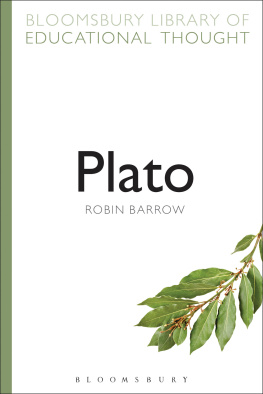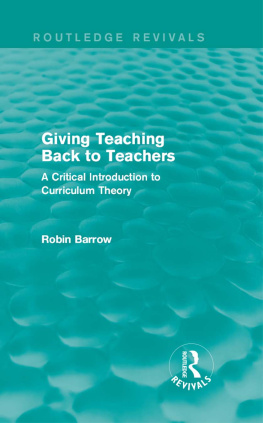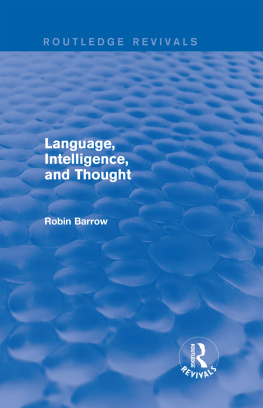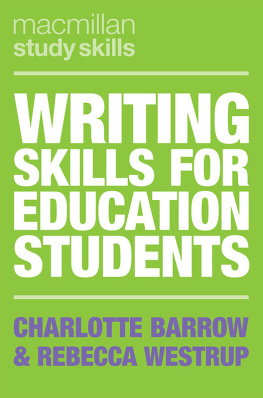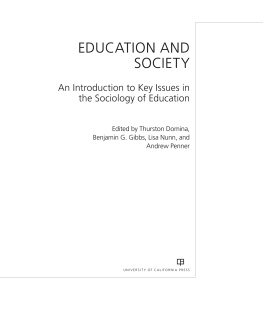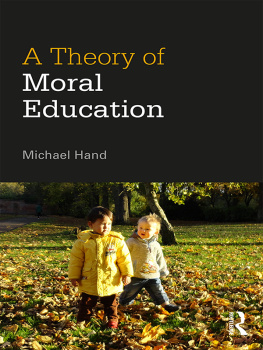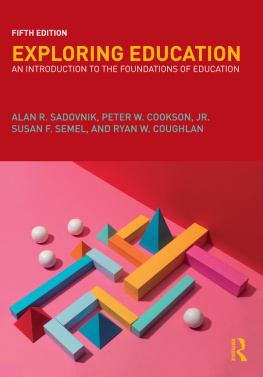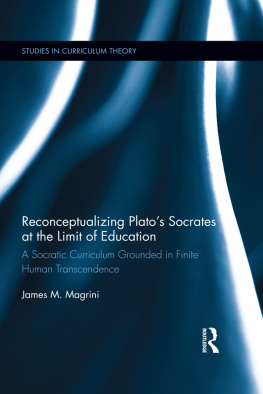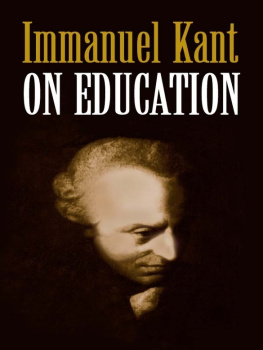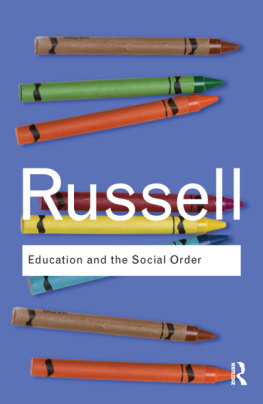Plato
Titles in the Bloomsbury Library of Educational Thought Series:
St Thomas Aquinas, Vivian Boland OP
Aristotle, Alexander Moseley
St Augustine, Ryan N. S. Topping
Pierre Bourdieu, Michael James Grenfell
Jerome Bruner, David R. Olson
Confucius, Charlene Tan
John Dewey, Richard Pring
Michel Foucault, Lynn Fendler
Paulo Freire, Daniel Schugurensky
John Holt, Roland Meighan
John Locke, Alexander Moseley
Loris Malaguzzi and the Reggio Emilia
Experience, Kathy Hall, Mary Horgan, Anna
Ridgway, Rosaleen Murphy, Maura Cunneen and Denice Cunningham
Maria Montessori, Marion ODonnell
A. S. Neill, Richard Bailey
John Henry Newman, James Arthur and Guy Nicholls
Robert Owen, Robert A. Davis and Frank OHagan
R. S. Peters, Stefaan E. Cuypers and Christopher Martin
Jean Piaget, Richard Kohler
Plato, Robin Barrow
Jean-Jacques Rousseau, Jrgen Oelkers
Rudolf Steiner, Heiner Ullrich
Leo Tolstoy, Daniel Moulin
Lev Vygotsky, Ren van der Veer
E. G. West, James Tooley
Mary Wollstonecraft, Susan Laird
Series Editor: Richard Bailey is a writer and researcher in education and sport. A former teacher in both primary and secondary schools and a teacher trainer, he has been Professor at a number of leading Universities in the UK. He now lives and works in Germany.
Members of the Advisory Board
Robin Barrow, Professor of Philosophy, Simon Fraser University, Canada.
Peter Gronn, Professor of Education, Head of Faculty, University of Cambridge, UK.
Kathy Hall, Professor of Education and Head of the School of Education at University College Cork, Ireland.
Stephen Heyneman, Professor of International Educational Policy at the College of Education and Human Development, Vanderbilt University, USA.
Yung-Shi Lin, President Emeritus and Professor, Department of Education and Institute of Graduate Studies, Taipei Municipal University of Education, Republic of China, Taiwan.
Gary McCulloch, Head of Department of Humanities and Social Sciences at the Institute of Education, University of London, UK.
Jrgen Oelkers, Professor of Education at the University of Zurich, Switzerland.
Richard Pring, Emeritus Professor at the Department of Education, and Emeritus Fellow of Green Templeton College, University of Oxford, UK.
Harvey Siegel, Professor and Chair of the Department of Philosophy, University of Miami, USA.
Richard Smith, Professor of Education, University of Durham, UK.
Zhou Zuoyu, Professor, Faculty of Education, Beijing Normal University, Peoples Republic of China
Plato
ROBIN BARROW
Bloomsbury Library of Educational Thought
Series Editor: Richard Bailey

Bloomsbury Academic
An imprint of Bloomsbury Publishing Plc
50 Bedford Square | 1385 Broadway |
London | New York |
WC1B 3DP | NY 10018 |
UK | USA |
www.bloomsbury.com
First published 2007 by Continuum International Publishing Group Paperback edition first published 2014 by Bloomsbury Academic
Robin Barrow, 2007
All rights reserved. No part of this publication may be reproduced or transmitted in any form or by any means, electronic or mechanical, including photocopying, recording, or any information storage or retrieval system, without prior permission in writing from the publishers.
Robin Barrow has asserted his right under the Copyright, Designs and Patents Act, 1988, to be identified as Authors of this work.
No responsibility for loss caused to any individual or organization acting on or refraining from action as a result of the material in this publication can be accepted by Bloomsbury Academic or the author.
British Library Cataloguing-in-Publication Data
A catalogue record for this book is available from the British Library.
ePUB ISBN: 978-1-4411-1509-6
Library of Congress Cataloguing-in-Publication Data
Barrow, Robin.
Plato/Robin Barrow.
p. cm.
Includes bibliographical references and index.
ISBN-13: 978-0-8264-8408-6 (hardcover)
ISBN-10: 0-8264-8408-5 (hardcover)
1. Plato. 2. EducationPhilosophy. 3. Education, Greek. I. Title.
LB85.P7B367 2007
370.1dc22
2007018508
Typeset by Aptara Books Ltd
I should like to dedicate this book to Brigitte Kappel, Huw Lloyd, Jack Martin and Neill Ross each of whom played an important part in helping me write it.
Contents
I am indebted to the Series Editor, Richard Bailey, Anthony Haynes of Continuum, Philip Gaisford, David Mirhady and an anonymous publishers reader for helpful comments. I am particularly indebted to Devi Pabla, without whom the word-processing and practical organization would never have got off the ground. My thanks to all these generous-spirited people.
Aristotle: |
An. post. | Analytica posteriora (Posterior Analytics) |
Eth. Nic. | Ethica Nicomachea (Nicomachean Ethics) |
Mag. mor. | Magna moralia |
Metaph. | Metaphysica (Metaphysics) |
Part. an. | De partibus animalium (Parts of Animals) |
Ph. | Physica (Physics) |
Pol. | Politica (Politics) |
Rh. | Rhetorica (Rhetoric) |
Top. | Topica (Topics) |
Diog. Laert. | Diogenes Laertius |
DK | H. Diels and W. Kranz: Fragmente der Vorsokratiker (6th edn) |
Hdt. | Herodotus |
Hor: | Horace |
Ars P. | Ars poetica (The Art of Poetry) |
Plato: |
Alc. | Alcibiades |
Ap. | Apology |
Chrm. | Charmides |
Grg. | Gorgias |
Hp. mi. | Hippias minor |
Phlb. | Philebus |
Prt. | Protagoras |
Symp. | Symposium |
Tht. | Theaetetus |
Ti. | Timaeus |
Plutarch: |
Quaest. conv. | Quaestiones convivales (Table Talk) |
Sextus Empiricus: |
Math. | Adversus mathematicos (Against the Mathematicians) |
Thuc. | Thucydides |
Xen: | Xenophon |
Ap. | Apologia Socratis (The defence speech of Socrates) |
Mem. | Memorabilia |
Education is sometimes presented as an essentially practical activity. It is, it seems, about teaching and learning, curriculum and what goes on in schools. It is about achieving certain ends, using certain methods, and these ends and methods are often prescribed for teachers, whose duty it is to deliver them with vigor and fidelity. With such a clear purpose, what is the value of theory?
Recent years have seen politicians and policy makers in different countries explicitly denying any value or need for educational theory. A clue to why this might be is offered by a remarkable comment by a British Secretary of State for Education in the 1990s: having any ideas about how children learn, or develop, or feel, should be seen as subversive activity. This pithy phrase captures the problem with theory: it subverts, challenges, and undermines the very assumptions on which the practice of education is based.
Next page
